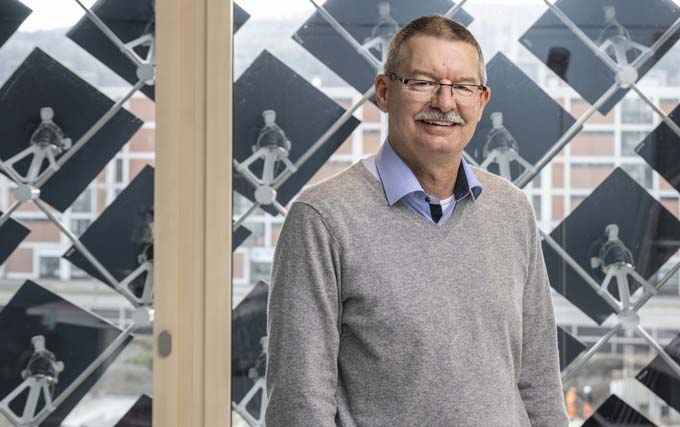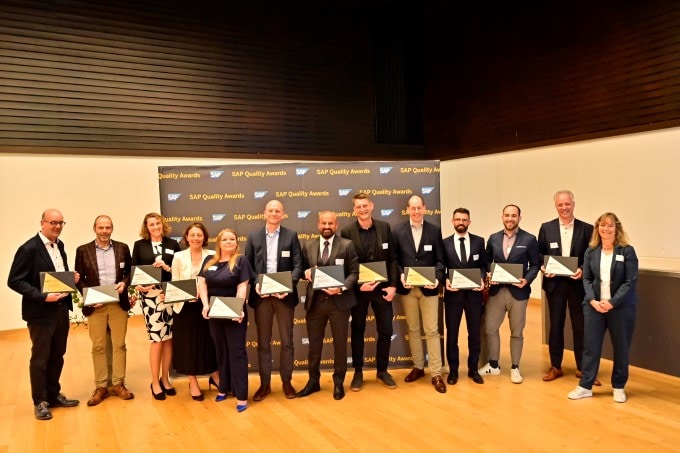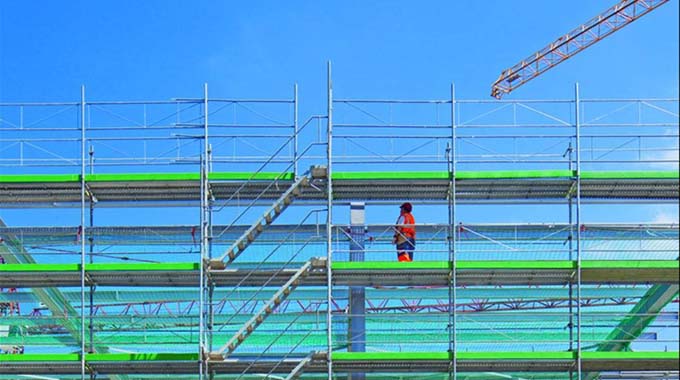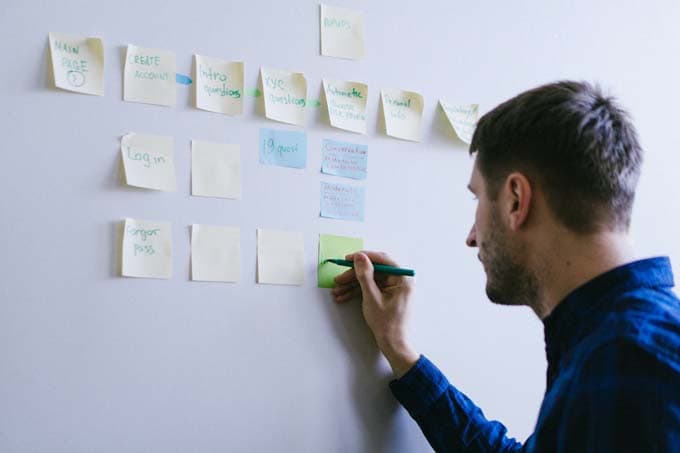Peter Richner, Empa: "Replacement of fossil fuels urgently needed".
In an interview, Peter Richner, Deputy Director Empa, talks about our energy future - and the difficulty of "forecasting".

Mr. Richner, energy scarcity has been one of the dominant topics in recent months - and is likely to continue to occupy us, see for example the continuation of a number of savings measures beyond the heating period. How did Empa manage to get through the winter?
Peter Richner: Thanks to a combination of warm weather and selective savings measures, we were able to reduce energy requirements by a total of 14% between October 2022 and March 2023 compared to the same period of the previous year. And, most importantly for us, we achieved this saving without having to accept any operational restrictions.
How exactly did you achieve this, what measures did you take?
We reduced room temperatures and lighting, eliminated domestic hot water, and consistently eliminated stand-by losses.
And will you continue with these measures? Or even take further steps towards sustainable energy supply?
We will certainly continue to implement the majority of the measures. In addition, we will continue to invest in optimized control of room temperatures, and we will commission a new type of seasonal heat storage system on our campus in Dübendorf this year, which will enable us to achieve further significant savings in heating energy.
The energy transition to a sustainable energy supply is currently on everyone's lips - partly because of the upcoming vote on the Climate and Innovation Act. Everybody involved seems to be passing around different figures that seem to support one point of view or another. Why is there such a "cacophony" of figures - are some simply unable to calculate?
Indeed, the numerous studies published by Empa and many others in recent months and years appear contradictory at first glance. However, it is important to note that they are only ever concerned with examining the results or consequences of certain decisions and actions, in the sense of an "IF-THEN". These are therefore possible scenarios - and not forecasts that would claim to accurately describe conditions in 2040 or 2050.
The assumptions underlying a study are therefore quite decisive for the results. Logically, these look different if, for example, one study assumes full exploitation of the potential for renewable energy in Switzerland - i.e. sun, wind, water and geothermal energy - and another study only partially activates this potential.
A good example of this is the work of Andreas Züttel and his colleagues, in which they investigated what it would mean if Switzerland wanted to cover 100% of its energy needs at all times through domestic production - in other words, if it were completely self-sufficient in energy. This is a situation that has not existed since at least the industrialization that began in the second half of the 19th century. The analysis shows that complete energy self-sufficiency would only be achievable at exorbitantly high costs in combination with massive interventions in our environment. In this respect, the study confirms the correctness of Switzerland's current strategy, which aims at a mix of energy efficiency, expansion of renewable energies in Switzerland, integration into the European power grid and global trade in renewable energy.
So that means the different costs simply depend on what you include in the "total bill" for the energy transition?
In addition to technical feasibility, costs naturally play a major role in all studies on the transformation of the energy system. Here, too, one has to look closely at each work, since there is no universally accepted definition of the "energy system". In addition, a distinction must be made between what are effective additional costs and what costs in the form of maintenance and replacement investments must be borne in any case - in other words, even without transforming our energy system. For example, the currently much quoted study by "Swiss Banking" mentions total costs of CHF 387 billion, of which 58%, i.e. CHF 225 billion, are replacement investments. Alone 35% of the total costs are incurred for the initial purchase of electric vehicles by private individuals. However, these are largely not additional costs, since in the period up to 2050 the entire vehicle fleet would be replaced at least once anyway and the costs of electric vehicles and internal combustion vehicles are constantly converging.
With all the differences in the various studies and models - where is there agreement, what is currently considered certain?
Everyone agrees that a complete replacement of fossil fuels is necessary. And this must be done as quickly as possible in order to keep the damage caused by global warming within acceptable limits. Furthermore, security of supply is insufficient due to the current high dependence on imports from partially critical regions.
The switch to renewable energies is associated with a strong electrification in building heating systems and in mobility, which at the same time leads to a large gain in energy efficiency: Both a heat pump and an electric motor are about three times more efficient than a boiler or a combustion engine. This leads to a reduction in primary energy demand, but at the same time to greater demand for electricity.
Covering them, especially in winter, is probably the biggest challenge to master. There is not THE right solution for this, but rather a multitude of variants. If one analyzes the various transformation paths, it is striking that they hardly differ in terms of the measures to be taken in the next few years: We need to significantly improve energy efficiency in all areas (buildings, mobility, industrial processes) and massively expand domestic renewable energy capacities. It is only in the second phase from 2030/2035 that there is a differentiation between the various scenarios, which differ primarily in the degree of self-sufficiency and the mix of technologies used.
Given the urgency and the magnitude of the challenge, it would therefore be appropriate to place more emphasis on the consistent implementation of the first steps we need to take in the next two to five years. We have used the last 15 years poorly, instead focusing discussions on describing the state of affairs in 2050 as accurately as possible. While this is certainly important, it should not prevent us from doing what is needed NOW - and what is also widely agreed upon.
What do you mean - "the last 15 years badly used"? What have we missed in Switzerland during this time?
A good example is the expansion of photovoltaic systems. The prices for PV modules have been falling exponentially for many years, between 2010 and 2020 by a factor of about 10! Parallel to this, the amount of installed PV capacity is increasing globally on a similar scale. Looking at the situation in Switzerland, however, it is noticeable that the addition of new capacity stagnated or even declined from 2013 onwards and only started to grow again from 2019 onwards. If the Swiss PV market had instead developed in parallel with the global market, the installed capacity in Switzerland would already be many times higher today. As a result, domestic electricity production would be correspondingly higher, and the manufacturing sector would also have developed accordingly during this period and would have significantly larger installation capacities today. This would put us in a much better position today in terms of electricity supply security.
How did this stagnation in the PV sector come about?
Actually, after Fukushima and Switzerland's turning away from nuclear technology, one would have expected that the expansion of alternative technologies at home would have been given high priority. This was obviously not the case. For too long, the focus was on an import strategy on the electricity side, even though it quickly became clear that our neighboring countries face similar challenges, especially in winter, and that concluding an electricity agreement with the EU is proving very difficult.
One more question about security of supply - this has been a high priority, and not just since the war in Ukraine. In order to achieve this, do we have to "produce" all our energy in Switzerland, i.e. become self-sufficient?
Once again, complete self-sufficiency makes neither economic nor ecological sense; the price is simply too high. It is also not part of Switzerland's energy strategy. Switzerland has not been self-sufficient in energy since industrialization; the same is true for many other aspects such as food, medicines, etc. It is much more important to build a resilient supply system based on strong domestic production with water, sun and possibly wind and geothermal energy with appropriate storage facilities. This is supplemented by the import of renewable energy, if necessary in the form of synthetic energy carriers such as hydrogen and methane, which can certainly be produced in areas far away from Switzerland. After all, there is an abundance of renewable energy there. However, two aspects are important: The sources of supply must be diversified so as not to become critically dependent on individual countries or regions of the world. And Switzerland needs to be well integrated into the European energy network. In the future, this will include not only electricity, but probably also hydrogen and synthetic methane. If we have no access or only limited access, our security of supply will be in question.
More information: Empa
This article originally appeared on m-q.ch - https://www.m-q.ch/de/peter-richner-empa-ersatz-fossiler-energietraeger-dringend-noetig/










 Why not share a ride service when you have the same destination. With an app, passengers simply book their ride. Just like you know it from other ridehailing services. They are picked up where they are or at defined stopping points, but they are always nearby. An intelligent algorithm processes all ride requests and bundles similar routes to ensure optimum capacity utilization.
Why not share a ride service when you have the same destination. With an app, passengers simply book their ride. Just like you know it from other ridehailing services. They are picked up where they are or at defined stopping points, but they are always nearby. An intelligent algorithm processes all ride requests and bundles similar routes to ensure optimum capacity utilization.

 It's no secret: the world's population is growing and needs safe and affordable food, while at the same time reducing its consumption of CO2 and plastic. As a leading global provider of packaging systems and solutions, SIG has the vision not only to change its customers' business for the better, but also to be a sustainability leader. On the occasion of the acquisition of Scholle
It's no secret: the world's population is growing and needs safe and affordable food, while at the same time reducing its consumption of CO2 and plastic. As a leading global provider of packaging systems and solutions, SIG has the vision not only to change its customers' business for the better, but also to be a sustainability leader. On the occasion of the acquisition of Scholle

 Planted is expanding its barbecue range with Planted Bratwurst, its first plant-based sausage. It is designed to be a more sustainable and healthier alternative to traditional grilling, the company says. With six natural ingredients, it is the cleanest sausage on the market, it says, and contains 76 percent less saturated fat and 18 percent less salt, but 36 percent more protein than an animal-based bratwurst.
Planted is expanding its barbecue range with Planted Bratwurst, its first plant-based sausage. It is designed to be a more sustainable and healthier alternative to traditional grilling, the company says. With six natural ingredients, it is the cleanest sausage on the market, it says, and contains 76 percent less saturated fat and 18 percent less salt, but 36 percent more protein than an animal-based bratwurst.


 Together with the Hüsler Nest team, four Jung-von-Matt companies contributed to a clear alignment of the brand for the next growth phase and thus ensured that the new Hüsler Nest brand identity results in a harmonious whole. And this across all communicative touchpoints, offline as well as online.
Together with the Hüsler Nest team, four Jung-von-Matt companies contributed to a clear alignment of the brand for the next growth phase and thus ensured that the new Hüsler Nest brand identity results in a harmonious whole. And this across all communicative touchpoints, offline as well as online.